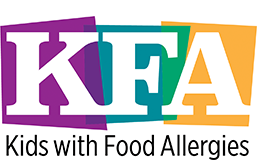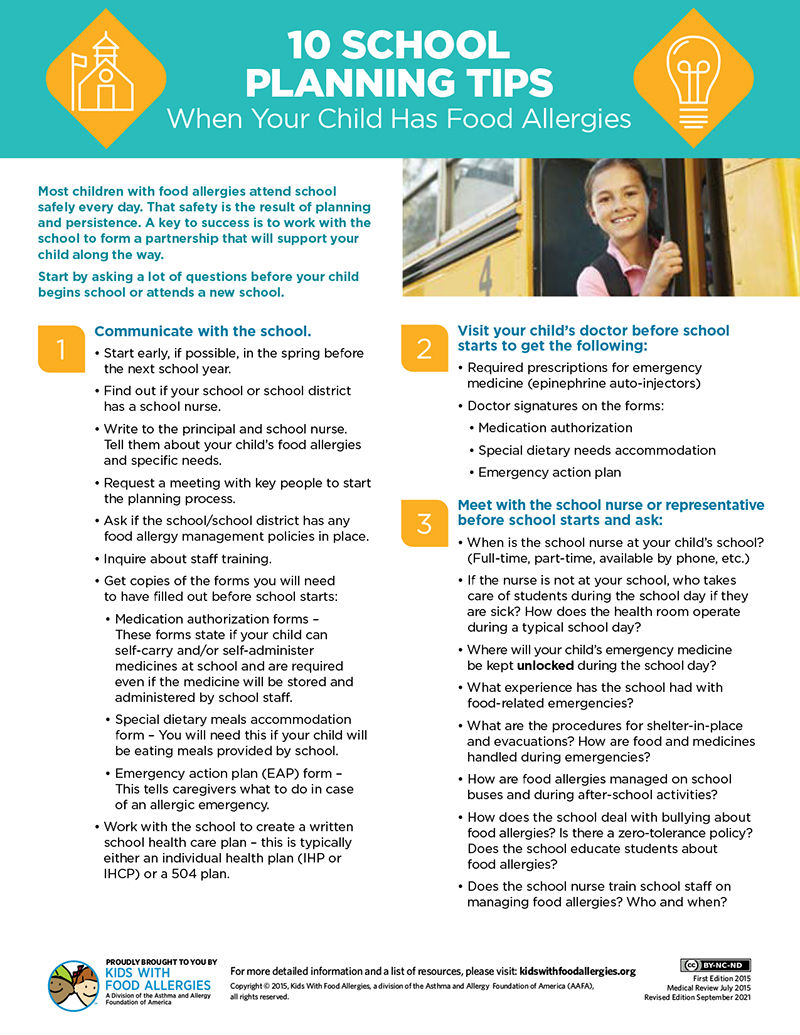Advocacy

Food Allergies in Schools
Around 45% of severe allergic reactions in schools start in the classroom. Many reactions occur in children who didn’t have a history of allergy. They may not have epinephrine with them. This highlights the need for policies to help protect school children with food allergies and support school staff in managing them.
The Asthma and Allergy Foundation of America (AAFA) and Kids with Food Allergies (KFA) support state policies related to food allergy management in schools in the following areas:
Medicine and treatment
- Stock epinephrine in schools to treat anyone who has anaphylaxis, a severe allergic reaction
- Protection for school staff so they are not held liable for using stock epinephrine
- On-site school nurses and training for school staff on how to recognize signs of an allergic reaction and how to handle it
- Requirements for schools to keep updated health records and incident reports about allergic reactions
Food allergy awareness
- Help states recognize the problems of food allergy in schools and the need for better management
School environment
- Training for school staff on managing food allergies and how to prevent allergic reactions
- Help parents and schools work together to create allergy-friendly environments and activities available for children with food allergies
Here are some ways AAFA and KFA raise awareness of how to manage food allergies in schools, as well as some school resources for schools and parents:
Closed
State Honor Roll Report
One way AAFA supports and tracks healthy food allergy settings in schools is through our State Honor Roll Report.
The State Honor Roll of Asthma and Allergy Policies for Schools ranks the states with the best public policies for people with asthma, food allergies, anaphylaxis, and related allergic diseases in U.S. elementary, middle, and high schools.
See where your state ranks by using our interactive map on statehonorroll.org.
Epinephrine Access
Children spend much of their days in school, where they may come in contact with food allergens that may cause anaphylaxis. This severe allergic reaction may be life-threatening if not treated right away with epinephrine.
We support school policies that require access to the life-saving medicine epinephrine to treat students and staff who have severe allergic reactions.
States should create policies that promote epinephrine access. This includes:
- Supplying schools with epinephrine to be used in emergencies
- Training school staff on when and how to use epinephrine auto-injectors and nasal spray
- Addressing liability concerns for people who use epinephrine in good faith
We urge state lawmakers to give schools access to undesignated epinephrine and train staff on how to use the medicine.
Food Allergy Management Resources
CDC Guidelines and Toolkit for Managing Food Allergies in Schools
The Centers for Disease Control and Prevention (CDC) offers tools to help schools manage food allergies:
- Voluntary Guidelines for Managing Food Allergies In Schools and Early Care and Education Programs – These guidelines include information school need to know about food allergies and allergic reactions, as well as methods for creating plans and allergy-friendly school environments.
- Food Allergies in Schools Toolkit – This toolkit contains tip sheets, training presentations, and podcasts to help school staff implement guidelines for managing food allergies in order to prevent and manage food allergy reactions in schools.
KFA School Zone
KFA’s School Zone provides resources to help parents work with their children’s schools to create a healthy learning environment. Resources include information on:
- Preparing for a new school year
- Creating school health care plans for food allergies, such as IHCPs, ECPs and 504 plans
- Non-food reward ideas and potential food allergens in arts and crafts
- Teaching self-management
- Understanding your child’s rights under federal and state laws
- Dealing with food allergy bullying
- Working with the food services staff and school nurses
Teal ClassroomTM: Food Allergy Awareness Kit
Teachers, school nurses and school administrators can use our Teal ClassroomTM: Food Allergy Awareness Kit to raise food allergy awareness among staff, students, and their families. The kit includes:
- Information on why it is important to have safe classrooms for students with food allergies
- Food allergy awareness lessons
- Printable posters, activity sheets and stickers
- Non-food reward ideas
- List of hidden allergens in school craft and art supplies
- Food allergy resource list
Our Advocacy Efforts for Food Allergies in Schools
AAFA and KFA support policies and laws that save lives and improve the quality of life for millions of people and families managing food allergies. Because this issue is one of our key policy priorities, we have been actively working to on behalf of the food allergy community to spread awareness to policymakers and other stakeholders. Here is some of the work we have been doing:
AAFA Sends Food Allergy Policy Priorities to White House – July 21, 2022
AAFA Sends Letter Supporting the Zacky Bill (AB-2640) in California![]() – March 24, 2022
– March 24, 2022
A Year in Advocacy – Better Food Labeling, Anaphylaxis Policies, and Healthy Schools – December 20, 2021
AAFA Sends Letter Supporting H.2222/S.1498 and S.1462![]() – May 3, 2021
– May 3, 2021
AAFA Sends Memorandum in Support of S.1043![]() – February 12, 2021
– February 12, 2021
It’s OFFICIAL: Huge AAFA Advocacy Victory! School-Based Allergies and Asthma Management Program Act, H.R. 2468 Becomes Law – January 5, 2021
AAFA Signs Letter Urging Proper Policies for Food Allergies Upon Schools Reopening![]() – May 6, 2020
– May 6, 2020
AAFA Sends Letter Supporting Anaphylaxis Related Bill S.7085![]() – March 10, 2020
– March 10, 2020
New Bill Would Protect Students With Allergies and Asthma – January 14, 2020
AAFA Testifies Before House Committee About H.R. 2468![]() – January 8, 2020
– January 8, 2020
AAFA Sends Letter Supporting Dockets Relating to Epinephrine and Anaphylactic Policies![]() – December 3, 2019
– December 3, 2019
AAFA Letter to Weatherford, Texas, Independent School District on Treatment of Severe Allergic Reactions![]() – January 16, 2019
– January 16, 2019
AAFA Comments on New Model for School Health Services in D.C.![]() – October 25, 2016
– October 25, 2016
References
1. Data Health Brief: Epinephrine Administration in Schools. Massachusetts Department of Public Health Bureau of Community Health Access and Promotion. School Health Unit. 2009-2010.
Become an Advocate
You can help us advocate on this issue and others to help reduce the burden of food allergies. Learn more about becoming a food allergy advocate and watch this page for updates on ways you can raise awareness about this issue.














